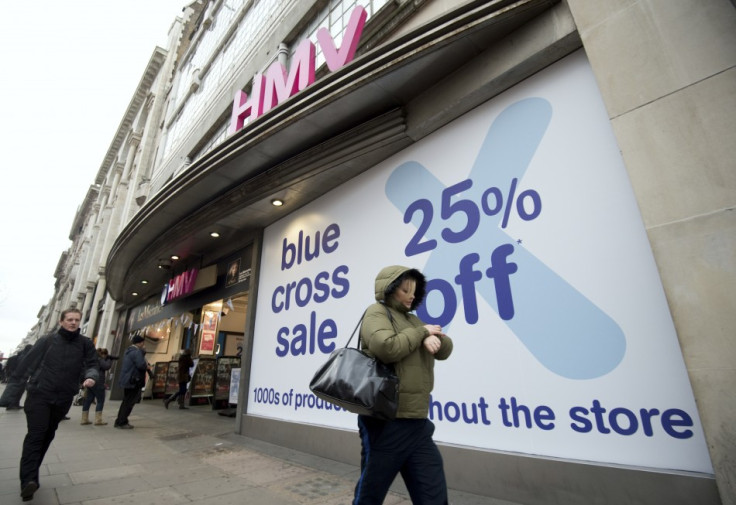Progress at a Price: HMV Group the Latest Victim of Britain's 'High Street' Evolution

"Progress has never been a bargain. You have to pay for it ... Sometimes I think there's a man who sits behind a counter and says, 'All right, you can have a telephone but you lose privacy and the charm of distance'; 'Mister, you may conquer the air but the birds will lose their wonder and the clouds will smell of gasoline'."
The stirring argument from the fictional barrister Henry Drummond in "Inherit the Wind", a play that fictionalises the famous - and factual - trial of an American school teacher charged with teaching the theories of Charles Darwin to his pupils in 1925, remains to this day one of the best summations of the cost of natural evolution.
Any number of clichés could aptly describe the mixed emotions many Britons are feeling about the demise of one of the nation's most famous retailers, HMV Group, which is fighting for its financial life after bosses failed to pull off a Christmas miracle and save the 92-year old firm from bankruptcy.
Sadness, yes, and a bit of guilt as well, but also a reluctant understanding of the price of progress.
The HMV move capped a miserable year for Britain's "High Street" - a colloquial and now seemingly anachronistic term for traditional storefront shops - which has claimed several major victims including Clinton Cards, JJB Sports, Game Group, Comet electronics and the camera retailer Jessops.
It's easy to understand why: we're increasingly shopping online for everything from tennis rackets to birthday cakes, and in a grim economy with flat wages in sticky-high inflation we're increasingly attracted by the cheaper prices that can be found by a click of the mouse.
It's also impossible to stop - more than half of all Britons own a smartphone, according to the research group Kantar Worldpanel, 41.5m are fully connected to the internet and online grocery sales alone surged past £5bn last year and have grown by 90 percent since 2008 - and we probably shouldn't even try.
Creative destruction is a phrase economists use to describe what you and I call progress - and it comes with a cost.
Thankfully, however, that cost is frequently offset by many benefits.
It's churlish and insensitive to make that case to the 5,000 people who worked at HMV and Jessops now looking for a new job, but it's nonetheless important for the rest of us to understand.
The online march that's driven HMV and others to the brink has also created hundreds of thousands of new British jobs, made a demonstrably beneficial impact on the broader UK economy and enriched the lives of citizens up and down the country, giving them better access to healthcare, legal advice, government information and each other.
An early academic study, first published in 2009 by the London School of Economics' Jonathan Liebenau, estimated that broadband development in Britain could create as many as 211,000 jobs each year. A McKinsey study says that for every job displaced by online activity in developed nations, 2.6 more are created at the same time.
A comprehensive report by BT, published last spring, estimated the economic impact of super-fast broadband in a single rural location in Britain to be as little as £143m and as much as £19.8bn. Rural infrastructure roll-outs create 1,800 new jobs, 1,400 new start-up small businesses and help support more than 7,800 home workers. The job-creation impact increases dramatically as the fibre is laid in larger towns and cities, particularly in London, where the estimate rises to around 26,000 - more than four times the jobs lost this week at HMV and Jessops.
We pay the price for these undeniable benefits, unfortunately, with the creative destruction of portions of the "old economy" that it forces into extinction.
Furthermore, the specific lessons of HMV's failure - which Ajay Bhalla, a professor of global innovation management at London's Cass Business School, says was largely the result of its slow-footed response to online competition - should serve as a warning to even the most historically entrenched business.
Only this week, Eastman Kodak, a 125-year old photographic icon which once enjoyed a 90 percent US market share and was shifting as much as $5.7bn in digital cameras each year less than five years ago, inked the final agreement on its multi-billion bankruptcy and sold its last remaining digital imaging rights for around $500m. Its rapid decline was largely the result of its inability to transition its cumbersome business and capture the explosive growth of online image sharing.
But while we should feel some emotion at the loss of both a once-dominant business and tens of thousands of people it employed, it's worth noting how many more new and dynamic jobs were created by the many firms that have pushed it aside and how much unknown potential exits in the new economic paradigm.
We lamented the "death" (greatly exaggerated, as ever) of the US manufacturing sector in the recession of the early 1990s, only to discover the birth of the digital economy a few years later that helped drive it - and that of the rest of the world - towards an historically unprecedented economic boom that lifted many millions out of poverty in the developing world and once again positioned the US at the forefront of technological advancement.
Similar, if smaller scale, potential exists in Britain's economy today, as difficult as it may be to visualise.
The slow, sad and admittedly painful demise of our traditional retail giants is both an unstoppable force and a powerful catalyst for necessary change.
© Copyright IBTimes 2025. All rights reserved.





















